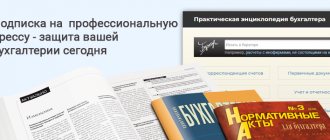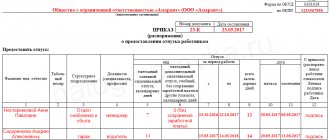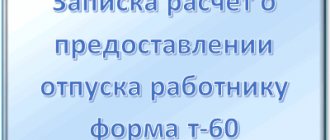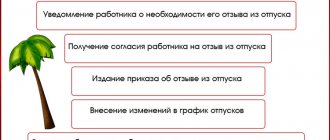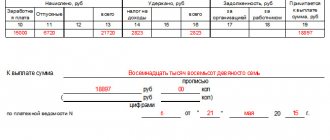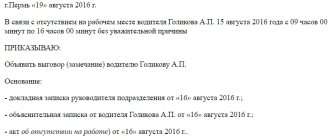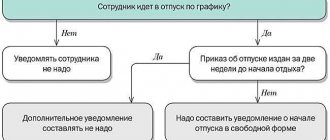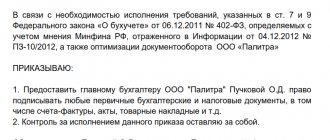Leave for donation
Employees of enterprises of various professions are ready to donate blood to help people in need.
This desire is laudable and supported by Art. 186 of the Labor Code of the Russian Federation and Federal Law of July 20, 2012 No. 125-FZ. A person has the right not to go to work both on the day of blood donation and on the day of the previous medical examination. For this reason, the enterprise issues an order for an additional day of rest for donating blood.
If, nevertheless, the employee worked on these days, then he can apply for rest at another time. Blood and its components may be collected on weekends or holidays. In this case, you can also claim your right to time off during working hours. The right must be exercised within a year from the date of donation.
Let’s take a closer look at compensation options for public sector employees.
| Fact of donation | If you go to work on this day | In case of absence from work on this day | If the day falls on a holiday or weekend |
| Day of medical examination | Upon request, you can take time off on any convenient working date. | Shifts are paid based on average earnings upon presentation of a certificate | Upon request, you can take time off on any convenient working date. |
| Blood donation day | Upon request, you can take time off on any convenient working date. | Shifts are paid based on average earnings upon presentation of a certificate | Upon request, you can take time off on any convenient working date. |
Who is entitled to additional leave by law?
The figure shows four categories of workers to whom employers are required to provide additional paid leave (Article 117 of the Labor Code of the Russian Federation).
It is important for the employer to consider the legal requirements for each type of additional leave. For example, not all “harmful workers” are entitled to additional paid leave. Only workers whose working conditions, based on the results of a special assessment (SOUT), are classified as harmful working conditions of the 2nd, 3rd or 4th degree or hazardous working conditions can count on it.
As for additional leave for irregular working hours, the right to it arises provided that the employee works on irregular working hours, and his position is included in the list of employees with irregular working hours, enshrined in the local act of the employer (Article 101 of the Labor Code of the Russian Federation, Letter of Rostrud dated May 24, 2012 No. PG/3841-6-1).
Such leave is granted regardless of whether the employee actually worked outside the normal working hours. At the same time, such employees can be recruited to work outside of normal hours only in exceptional cases, and such employees are exempted from working on weekends and holidays in accordance with the generally established procedure (Letter of the Ministry of Labor dated October 13, 2020 No. 14-2/OOG-15911).
If the donor does not want to rest
The legislation provides compensation only for payment of average earnings on the day of blood donation and on the day of medical examination, as well as the provision of time off for these days. Therefore, if the donor does not want to rest, then this is his right, but the possibility of replacement with cash payment is not provided (Article 186 of the Labor Code of the Russian Federation and Federal Law No. 125-FZ of July 20, 2012). If an employee wishes to receive legal compensation, then the application must be submitted no later than the last day of work. After which a sample order for donor days should be drawn up in form T-6.
Are part-time workers entitled to additional leave?
If an external or internal part-time worker belongs to the category of employees who are entitled to additional paid leave, the employer is obliged to provide him with such leave - the part-time worker has the same rights and guarantees as the main employee.
An exception is provided only for external part-time workers who combine work with training. They are granted additional study leave only at their main place of work (Part 1 of Article 287 of the Labor Code of the Russian Federation).
According to the controllers, a part-time worker is not entitled to additional paid leave for irregular working hours, since in principle he cannot be established such a regime (the duration of his working hours is limited by law). At the same time, the law does not prohibit the establishment of irregular working hours for an external part-time worker in cases where the restriction regime is not in effect. For example, when a part-time worker is suspended from work at his main place of work for medical reasons (part 2, 4 of article 73, part 2 of article 284, article 101 of the Labor Code of the Russian Federation). In this case, the compensation provided for irregular working hours should be provided to him in full, as well as to the main employees (part 1 of article 119, part 2 of article 287 of the Labor Code of the Russian Federation).
Additional permission for Chernobyl victims
Chernobyl victims are a preferential category of citizens, which is confirmed by Art. 122, 123 of the Labor Code of the Russian Federation and Russian Law No. 1244-1 of May 15, 1991. Additional leave for such employees ranges from 7 to 30 days.
An order is issued in form T-6 based on an application from the employee.
The employee was not provided with additional leave - what will happen to the employer?
The employer faces administrative liability under Parts 1 and 2 of Art. 5.27 of the Code of Administrative Offenses of the Russian Federation, if he, for example, does not provide additional leave for an irregular working day, or refuses to allow an external part-time worker to go on leave simultaneously with leave for his main job, in violation of Part 1 of Art. 286 Labor Code of the Russian Federation.
The amount of fines under Art. 5.27 of the Code of Administrative Offenses of the Russian Federation ranges from 1,000 to 5,000 rubles for an individual entrepreneur and an official, and from 30,000 to 50,000 rubles for a company. And with repeated violations, these amounts increase significantly.
Administrative responsibility under Art. 5.31 of the Code of Administrative Offenses of the Russian Federation is provided for those employers who have denied an employee additional leave prescribed in the collective agreement. The fine is from 3,000 to 5,000 rubles.
In addition, the employer will have to compensate for moral damage to the employee if his rights to additional leave are violated and the employee makes such demands (Article 237 of the Labor Code of the Russian Federation, paragraph 63 of the Resolution of the Plenum of the Armed Forces of the Russian Federation dated March 17, 2004 No. 2).
If you have any unresolved questions, you can find answers to them in ConsultantPlus.
Full and free access to the system for 2 days.
Additional permits for military personnel
Military personnel are special employees whose work involves high risk. For this category of citizens, additional rest is provided, which is approved by the Order of the Ministry of Defense of the Russian Federation on additional leave for military personnel dated May 24, 2003 No. 178, regulated by Art. 11 Federal Law dated May 27, 1998 No. 76-FZ. Vacation can be:
- educational, creative, illness and personal circumstances;
- for combat veterans;
- for Chernobyl victims;
- after space flight.
In many cases, the duration is further extended by the time required to travel to and from the holiday destination.
The basis for such rest is considered to be an order from the commander of the military unit. Remember that the serviceman has the right to ask to replace such rest with monetary compensation.
Paid and unpaid additional leaves
Additional leaves can be either paid or unpaid.
Unpaid additional leave is not very common. For example, such leave may be provided for by a collective agreement for:
- an employee with two or more children under 14 years of age;
- an employee who has a disabled child under 18 years of age;
- a single mother raising a child under 14 years of age;
- a father raising a child under 14 years of age without a mother.
It is also provided to people's vigilantes, volunteer firefighters (Part 2 of Article 128, Article 263 of the Labor Code of the Russian Federation, Part 3 of Article 26 of the Federal Law of 04/02/2014 No. 44-FZ, Part 7 of Article 18 of the Federal Law of 06/05. 2011 No. 100-FZ).
Additional holidays required by law are always paid.
Documentation of replacement of vacation with monetary compensation
To create a “vacation surplus,” so to speak, it is necessary that a person does not take a full vacation or part of it during the previous period.
According to Part 3 of Article 124 of the Labor Code of the Russian Federation, in exceptional cases when the provision of leave to an employee in the current year may adversely affect the normal course of work of the organization, it is allowed, with the consent of the employee, to transfer the leave to the next working year. In this case, the leave must be used no later than 12 months after the end of the working year for which it is granted.
The norm concerning this issue is also in Article 125 of the Labor Code of the Russian Federation. In particular, Part 2 of this article states that recall of an employee from vacation is allowed only with his written consent. The part of the vacation unused in this regard must be provided at the employee’s choice at a time convenient for him during the current working year or added to the vacation for the next working year.
Having analyzed these provisions of the Labor Code of the Russian Federation, we can imagine two cases when a situation arises in which an employee did not take vacation at the allotted time:
- The first option: the employee cherished the dream of going on vacation, but for his native organization his potential absence threatened collapse and death, and therefore the management asked the poor fellow not to leave his “father’s” house, to which he sacrificially agreed;
- The second option: the employee still managed to retire, but in the middle of his vacation he was again asked to return, citing the fact that the organization could not do without his presence.
In both of these cases, firstly, it is advisable to have written justification that granting leave to an employee may adversely affect the normal course of work of the organization .
Secondly, it is necessary to obtain the employee’s written consent :
- in the first case - only to postpone the vacation to the next year;
- in the second case, in addition to this, you will also need consent to recall him from the next vacation.
A vacation recall is usually formatted as follows. The immediate superior writes a memo asking him to recall his subordinate from his next vacation. This document must indicate the reason why the “poor fellow” is being returned to his workplace. The employee’s consent can be confirmed by the corresponding inscription at the bottom of this document. We offer you an example of the design of a memo (see Example 1). Based on this memo, an order to recall the employee from the next vacation (see Example 2).
To obtain the employee’s consent to postpone the vacation to the next calendar year, you can draw up a notice (see Example 3) and, based on it, issue an order (see Example 4).
